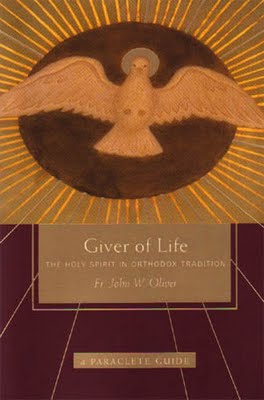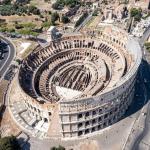 One of the things I appreciate about Fr John Oliver’s writing is the little gems he tucks away in the text. These cause a pleasant stumbling along the way. This style, prevalent in his first book, permeates his latest work on the subject of the Holy Spirit.
One of the things I appreciate about Fr John Oliver’s writing is the little gems he tucks away in the text. These cause a pleasant stumbling along the way. This style, prevalent in his first book, permeates his latest work on the subject of the Holy Spirit.
Giver of Life – The Holy Spirit in Orthodox Tradition serves as a primer for those new to the Faith, as well as a vivid enhancement for the tried and true whose vision may have grown monochrome.
Quoting a hymn to the Holy Spirit, Fr John sets the tone in the Preface:
“The life-creating Spirit, Who descended like a dove upon Christ in the Jordan, rested also upon me in the font of baptism. But the influence of His goodness hath weakened because of the darkness of my falls into sin. Wherefore, as a traveler lost in the forest at night doth wait for the light, so do I await Thy rays, O Good One, lest I perish utterly.” (Emphasis – mine.)
Fr John’s craft affords us a shared journey through his words and understanding. He has a way of making the complex less so; the mysterious bubbles up into the light. Turns of phrase, if nothing else, make this short read worth while. For instance, speaking of Pentecost:
“Jesus, risen from the dead, had ascended from earth to heaven ten days earlier. His disciples, still winded with wonder, were now gathered …” (Emphasis – mine.)
Is that cool or what? — winded with wonder.
Hang on a sec, there’s larger gems:
“The grace of God pours forth everywhere and upon all yet changes only the willing” (p.28).
“The Comforter convicts, so the pain He comes to soothe is often a pain He Himself inflicts” (p.29).
“Chastening and comfort are two hands with which God fashions new children out of old creations” (p.29).
“Humans are better suited to experience God than to explain Him” (p.51).
“The bubbling of a mountain stream, simple yet nourishing, the clean whisper of falling snow in the night forest, the sleeping infant, defenseless yet overpowering, the deep energy shared between two persons with walls lowered enough to love — these are the kinds of experiences that, when received at a perfect and often unscripted moment by those open to what they have to give, have stirred poets to rhapsodize and lovers to sing. And yet, poets and lovers, painfully aware of the impermanence of experience, yearn for whatever these experiences point toward — something no longer fleeting, but permanent and unchanging and simply good. Something, or Someone. There grows within us a sacred frustration as we approach the essence-energies distinction in God: we feel God in our insatiable desire for more of Him” (p.56).
“Without the Holy Spirit, joy degenerates into the pursuit of pleasure. We maneuver through life solely to avoid pain. We pursue only light and lose the ability to embrace the darkness so necessary for spiritual growth. We imperceptibly knit ourselves to the fabric of this passing world with its transitory comforts. Because we live in search of the next good time, we grow weak …
Good stuff, huh? Fr John continues:
With the Holy Spirit, joy is not forced to become happiness. We are willing to sacrifice pleasure and happiness so that joy, which is not as dependent on circumstance, might emerge. We rest in the promises of God that run deeper than everything that troubles life’s surface. We know how to rejoice with those who rejoice, seeking nothing of our own and feeling no competition. To acquire the Holy Spirit is to embrace joy and reject its counterfeits” (p.69).
Okay, I’d better stop. It’s a small book and soon I’ll be guilty of stealing it all.
But, a couple lines about the waters of baptism:
“When the Holy Spirit descends upon the font, the water within becomes much more than two parts hydrogen, one part oxygen. In a sense, the water becomes one full part material and one full part spiritual, it remains completely water, yet is mystically filled with grace and able to impart divine life” (p.87).
Okay, okay! Just one more and I’ll leave the rest to you:
“To read through the New Testament is to behold, in one sense, the photograph of a baby. We see the Church not in a state of realized fullness, as if it were suddenly birthed into perfect maturity, but with its perfection in germinal form. if the Church is the ‘body of Christ’ (1 Cor. 12:27) and if the Christ child ‘increased in wisdom and stature, and in favor with God and men’ (Luke 2:52), then we can accept that the Church after Pentecost also increased in wisdom and stature, and in favor with God and men” (p.47).
Y’all, I promise, last one (but, given the current affairs of the Church in America, I couldn’t resist):
“Exploring Church history expecting to find nothing but sweetness and light is a bit like exploring a hospital expecting to find nothing but well and healthy people” (p.13).
Order your copy of Fr John Oliver’s Giver of Life – The Holy Spirit in Orthodox Tradition …
Here
or
Here.
Hear! Hear!











